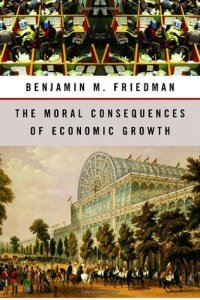
Ebook: The Moral Consequences of Economic Growth
Author: Benjamin M. Friedman
- Genre: Business // Responsibility and Business Ethics
- Year: 2005
- Publisher: Knopf
- Language: English
- epub
From the author of Day of Reckoning, the acclaimed critique of Ronald Reagan’s economic policy (“Every citizen should read it,” said The New York Times): a persuasive, wide-ranging argument that broadly distributed economic growth provides benefits far beyond the material, creating and strengthening democratic institutions, establishing political stability, fostering tolerance, and enhancing opportunity.
“Are we right,” Benjamin M. Friedman asks, “to care so much about economic growth as we clearly do?” To answer, Friedman reaches beyond economics. He examines the political and social histories of the large Western democracies—particularly of the United States since the Civil War—distinguishing times of generally rising living standards from those of pervasive stagnation to illustrate how rising incomes render a society more open and democratic. He shows, too, how our attitudes toward economic growth and its consequences have roots in the thinking of prior centuries, especially the Enlightenment, and also include significant strands of religious influence.
Friedman also delineates the role of economic growth in determining which developing nations extend the broadest freedoms to their citizenry. He makes clear that growth, rather than just the level of living standards, is key to effecting political and social liberalization in the third world. But he also warns that the democratic values of countries even as wealthy as our own are at risk whenever incomes stagnate for extended periods. Merely being rich is no protection against a society’s retreat into rigidity and intolerance once enough of its citizens lose the sense that they are getting ahead.
Finally, Friedman shows us why, if America is to strengthen democratic institutions around the world as a bulwark against terrorism and social unrest, we must aggressively pursue growth at home and promote worldwide economic expansion beyond what purely market-driven forces would create. And for the United States, he offers concrete suggestions for policy steps to achieve those objectives.
A major contribution to the ongoing debate on the effects of economic growth and globalization.
“Are we right,” Benjamin M. Friedman asks, “to care so much about economic growth as we clearly do?” To answer, Friedman reaches beyond economics. He examines the political and social histories of the large Western democracies—particularly of the United States since the Civil War—distinguishing times of generally rising living standards from those of pervasive stagnation to illustrate how rising incomes render a society more open and democratic. He shows, too, how our attitudes toward economic growth and its consequences have roots in the thinking of prior centuries, especially the Enlightenment, and also include significant strands of religious influence.
Friedman also delineates the role of economic growth in determining which developing nations extend the broadest freedoms to their citizenry. He makes clear that growth, rather than just the level of living standards, is key to effecting political and social liberalization in the third world. But he also warns that the democratic values of countries even as wealthy as our own are at risk whenever incomes stagnate for extended periods. Merely being rich is no protection against a society’s retreat into rigidity and intolerance once enough of its citizens lose the sense that they are getting ahead.
Finally, Friedman shows us why, if America is to strengthen democratic institutions around the world as a bulwark against terrorism and social unrest, we must aggressively pursue growth at home and promote worldwide economic expansion beyond what purely market-driven forces would create. And for the United States, he offers concrete suggestions for policy steps to achieve those objectives.
A major contribution to the ongoing debate on the effects of economic growth and globalization.
Download the book The Moral Consequences of Economic Growth for free or read online
Continue reading on any device:

Last viewed books
Related books
{related-news}
Comments (0)